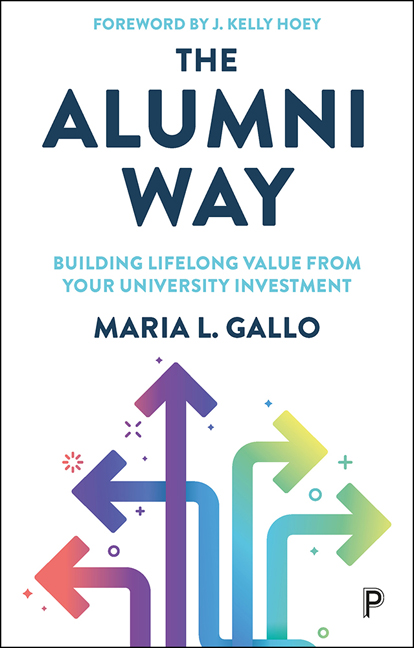Book contents
- Frontmatter
- Dedication
- Contents
- Acknowledgements
- Foreword
- Introduction: We are all alumni
- PART I Charting the course of the Alumni Way
- PART II The Alumni Way trait: Reflection
- PART III The Alumni Way trait: Curiosity
- PART IV The Alumni Way trait: Passion
- PART V The Alumni Way trait: Generosity
- PART VI Alumni: Bringing it into our lives
- Notes
- References
- About the author
- Index
12 - Immersing in our passions: The alumni dimension
Published online by Cambridge University Press: 13 May 2022
- Frontmatter
- Dedication
- Contents
- Acknowledgements
- Foreword
- Introduction: We are all alumni
- PART I Charting the course of the Alumni Way
- PART II The Alumni Way trait: Reflection
- PART III The Alumni Way trait: Curiosity
- PART IV The Alumni Way trait: Passion
- PART V The Alumni Way trait: Generosity
- PART VI Alumni: Bringing it into our lives
- Notes
- References
- About the author
- Index
Summary
Don't skip this section. Life is beyond our careers. We make time for our family and friends, leisure activities, travel adventures, spiritual nurturing, and healthy pursuits. As students, we found ourselves in a place to discover the essence of ourselves. As alumni, how can our alma mater contribute to our lives? This section isn't about becoming passionate about our alma mater per se. It is identifying those things in life that bring us joy.
Researchers suggest that passion plays a key role in contributing to that elusive fulfilling life. While we can associate passions with negative traits, psychologist Robert Vallerand and his colleagues describe harmonious passion in an article entitled Les Passions de l’Âme (Passions of the Soul): ‘Such passions become central features of one's identity and serve to define the person. … Those who have a passion for playing the guitar, for reading, or for jogging do not merely play the guitar, read, or jog. They are “guitar players”, “readers”, or “joggers”. Passionate activities are part of who they are.’ Being passionate integrates our quality of life and our development as a person. We exert effort to learn a new language, hike a mountain, or volunteer to care for animals. The Alumni Way trait of passion complements the trait of generosity discussed in the next section. We often see our passions thrive when we give of ourselves. Our alumni capital connects us to our wider identities and shared communities too: ethnic and cultural groups, religious faiths, being from one place and living in another.
Our alma mater appears everywhere: the bio of our favourite blogger, an introductory speech, front and centre on our social media profiles. The words ‘he graduated from … ‘, or ‘she completed her degree at … ‘ or ‘they studied at … ‘ are common. This tells us something about the person. It anchors them to something familiar. What is the fourth indicator on Wikipedia? Alma mater. This form of identification is different to identity. J Travis McDearmon explores the nuance of difference through alumni role identity. We may recognize and identify our alma mater as exactly that, the place we went to school, but we may not see it as part of who we are.
- Type
- Chapter
- Information
- The Alumni WayBuilding Lifelong Value from your University Investment, pp. 105 - 108Publisher: Bristol University PressPrint publication year: 2021



